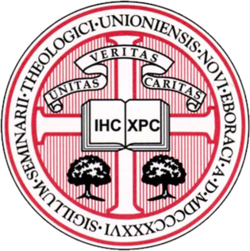Union Theological Seminary
(Seminary) | |
|---|---|
 | |
| Motto | Unitas, Veritas, Caritas (Latin) |
| Formation | 1836 |
| Headquarters | |
| Type | Private |
| A bastion of progressive Christian scholarship. | |
Union Theological Seminary in the City of New York (UTS) is a non-denominational Christian seminary[1] in Morningside Heights, Manhattan, New York City. It is affiliated with neighboring Columbia University. Since 1928, the seminary has been Columbia's constituent faculty of theology. In 1964, UTS also established an affiliation with the neighboring Jewish Theological Seminary of America.
UTS is the oldest independent seminary in the United States and has long been known as a bastion of progressive Christian scholarship, with a number of prominent thinkers among its faculty or alumni. It was founded in 1836 by members of the Presbyterian Church in the USA,[2] but was open to students of all denominations. In 1893, UTS rescinded the right of the General Assembly of the Presbyterian Church to veto faculty appointments, thus becoming fully independent. In the 20th century, Union became a center of liberal Christianity. It served as the birthplace of the Black theology, womanist theology, and other theological movements. It houses the Burke Library at Union Theological Seminary, one of the largest theological libraries in the Western Hemisphere.[3]
Contents
History
Early history
Union Theological Seminary was founded in 1836. During the late 19th century it became one of the leading centers of liberal Christianity in the United States. In 1891, Charles A. Briggs, who was being installed as the chair of biblical studies, delivered an inaugural address in which he questioned the verbal inspiration of Scripture.[4] When the General Assembly of the Presbyterian Church in the U.S.A. vetoed Briggs' appointment and eventually deposed Briggs for heresy two years later, Union removed itself from denominational oversight.[5][6]
Union Settlement
In 1895, members of the Union Theological Seminary Alumni Club founded Union Settlement Association, one of the oldest settlement houses in New York City. After visiting Toynbee Hall in London and inspired by the example of Hull House in Chicago, the alumni decided to create a settlement house in the area of Manhattan enclosed on the north and south by East 96th and 110th Streets and on the east and west by the East River and Central Park.
The neighborhood, known as East Harlem, was filled with new tenements but devoid of any civic services. The ethos of the settlement house movement called for its workers to "settle" in such neighborhoods in order to learn first-hand the problems of the residents. “It seemed to us that, as early settlers, we had a chance to grow up with the community and affect its development,” wrote William Adams Brown, Theology Professor, Union Theological Society (1892–1930) and President, Union Settlement Association (1915–1919).[7]
Union Settlement still exists, providing community-based services and programs to support the immigrant and low-income residents of East Harlem. One of East Harlem's largest social service agencies, Union Settlement reaches more than 13,000 people annually at 17 locations throughout East Harlem through a range of programs, including early childhood education, youth development, senior services, job training, the arts, adult education, nutrition, counseling, a farmers' market, community development, and neighborhood cultural events.
20th century to present
Reinhold Niebuhr and Paul Tillich made UTS the center of both liberal and neo-orthodox Protestantism in the inter-war period. Niebuhr joined UTS in 1929 and Tillich in 1933. Prominent public intellectual Cornel West commenced a promising academic career at UTS in 1977. As liberalism lost ground to conservatism after the 1960s (while neo-orthodoxy dissipated) and thus declined in prestige, UTS ran into financial difficulties and shrank significantly because of a reduced student base.
Eventually, the school agreed to lease some of its buildings to Columbia University and to transfer ownership of and responsibility for the Burke Library to Columbia. These agreements helped stabilize the school's finances, which had been hobbled by increasing library costs and the need for substantial campus repairs.
On July 1, 2008, feminist theologian Serene Jones became Union's first female president in its 172-year history, succeeding Joseph C. Hough, Jr.[8]
On June 10, 2014, Jones announced that the Seminary would be joining the movement to divest from the fossil fuels industry in protest at the damage the industry is causing to the environment.[9] The Seminary's $108 million endowment will no longer include any fossil fuel investments.[10]
Alumni on Wikispooks
| Person | Born | Died | Nationality | Summary | Description |
|---|---|---|---|---|---|
| Henry Sloane Coffin | 5 January 1877 | 25 November 1954 | Clergy | leading liberal Presbyterian leader. Bonesman. | |
| Steven Clark Rockefeller | 19 April 1936 | US |
References
- ↑ https://utsnyc.edu/about/mission-vision/
- ↑ http://archive.today/20120805191253/http://www.utsnyc.edu/Page.aspx?&pid=758
- ↑ https://library.columbia.edu/libraries/burke.html
- ↑ Hart, D. G.; Muether, John (2007). Seeking a Better Country: 300 Years of American Presbyterianism. Phillipsburg, N.J.: Presbyterian & Reformed Publishing. p. 183.
- ↑ Hart & Muether, pg. 183
- ↑ https://web.archive.org/web/20100221015803/http://www.auburnsem.org/about/welcome.asp?nsectionid=1&pageid=1
- ↑ A Teacher and His Times, William Adams Brown, Scribner, 1940.
- ↑ http://archive.today/20120805182824/http://www.utsnyc.edu/Page.aspx?pid=1081&srcid=332
- ↑ =https://web.archive.org/web/20160303233458/http://www.weareclimatechange.com/pages/news_articles/union_ny_seminary/union_ny_seminary.html
- ↑ http://senate.columbia.edu/orientation_materials/senate_guide_2018-2019_20190206.pdf